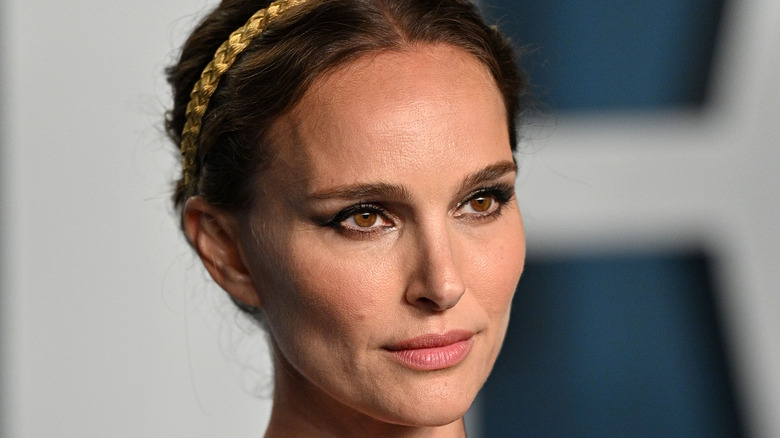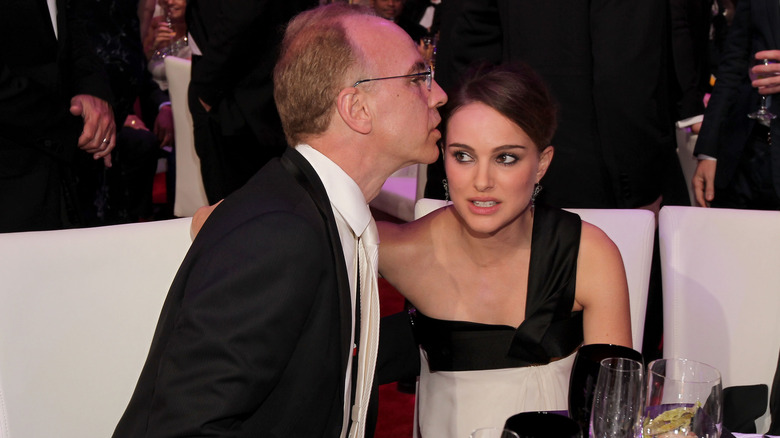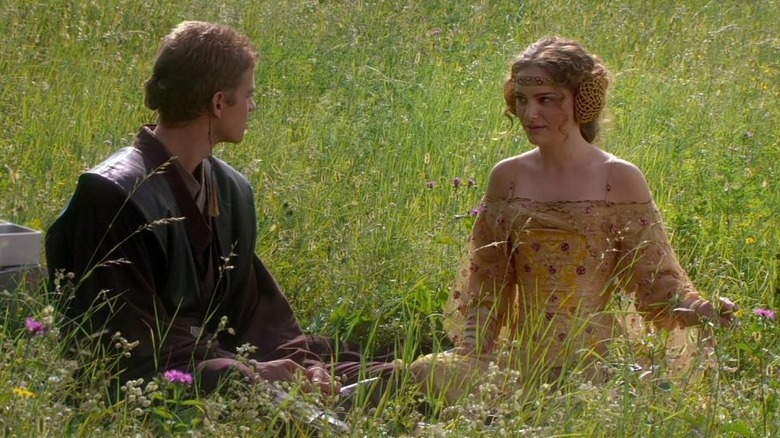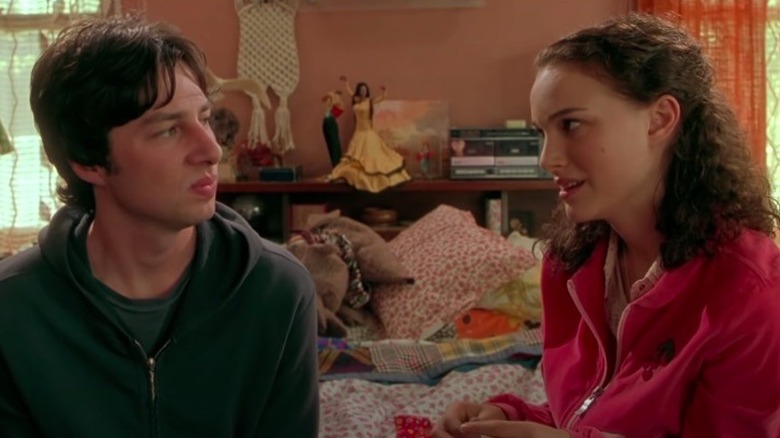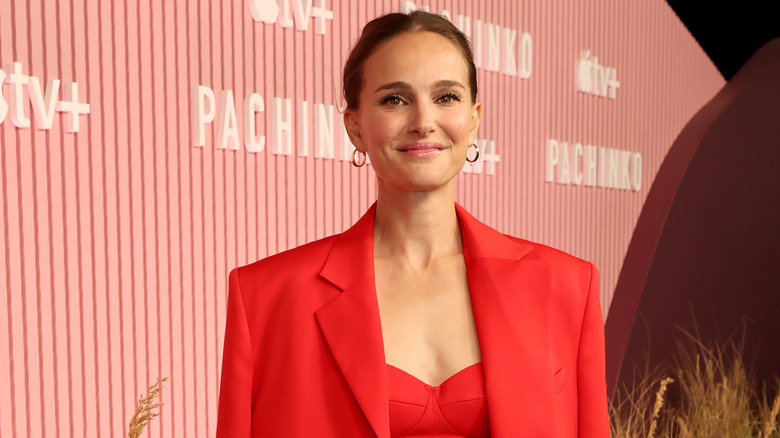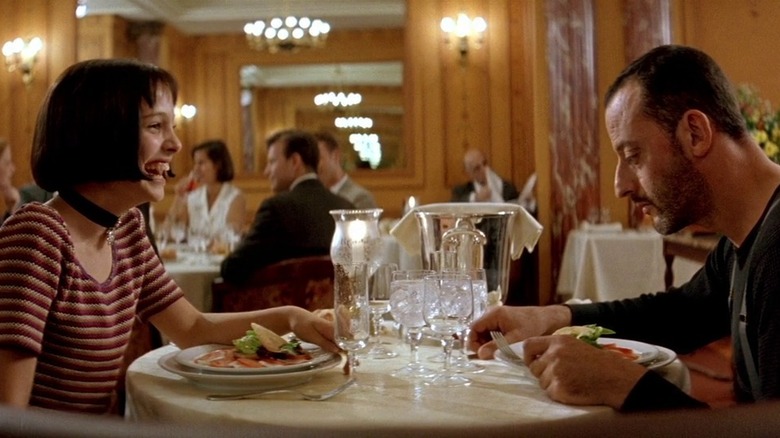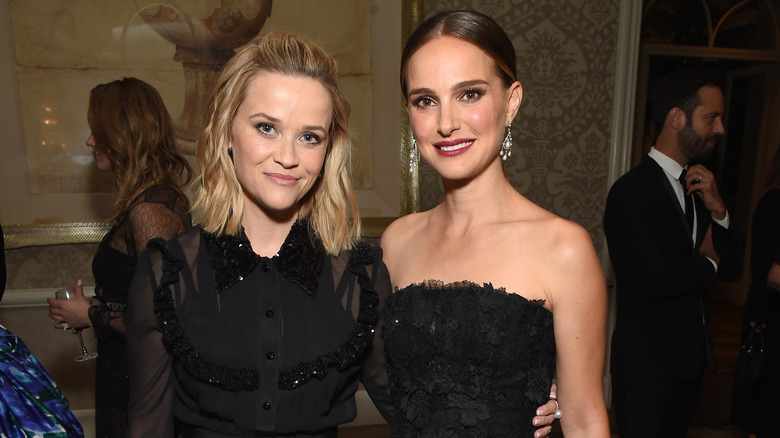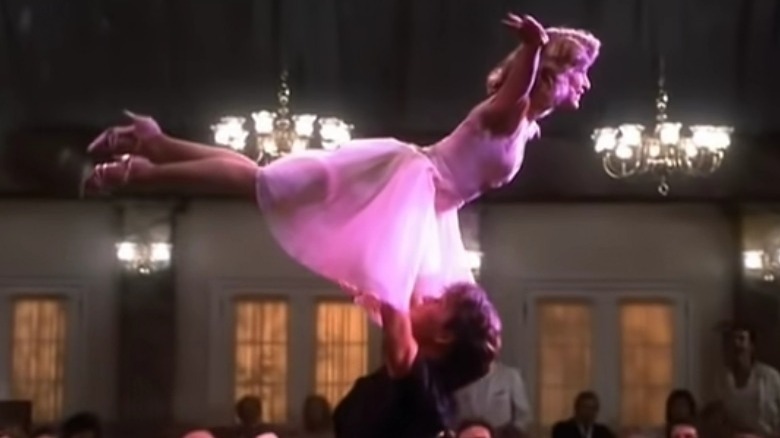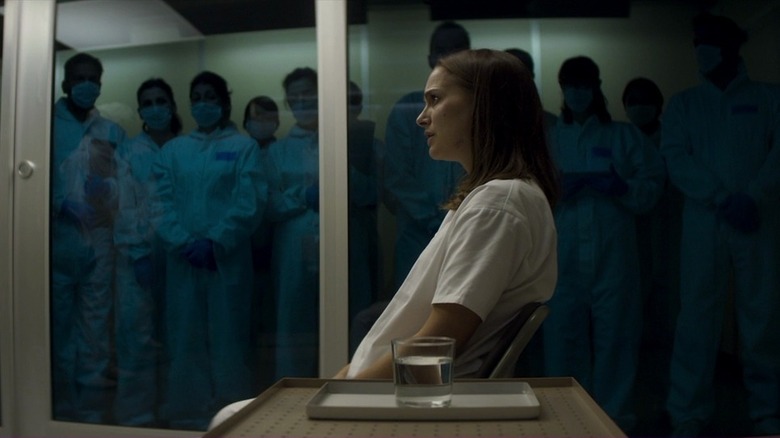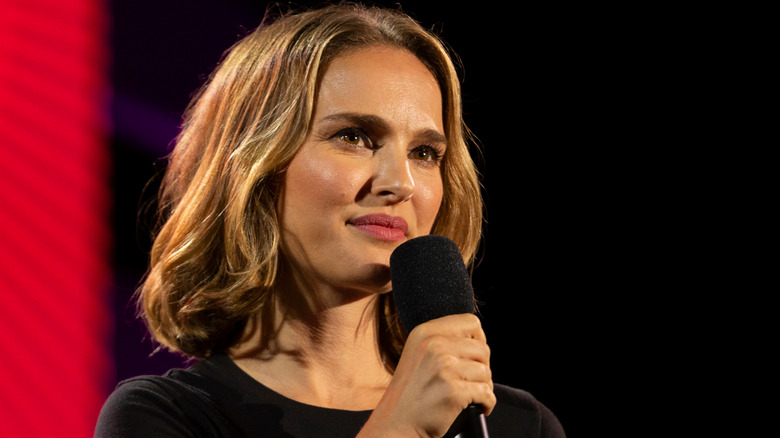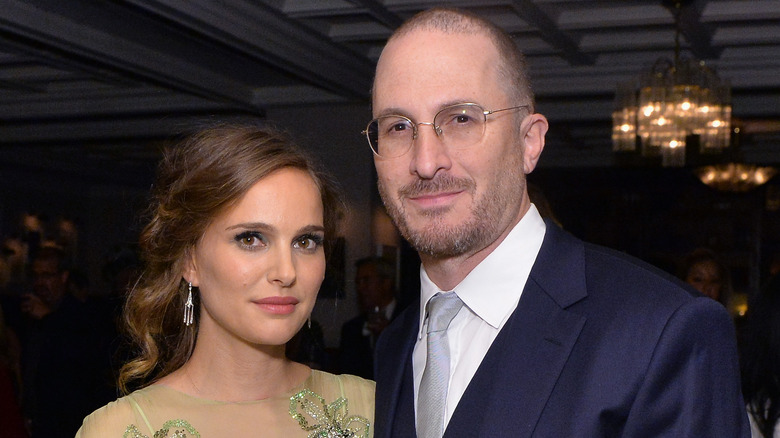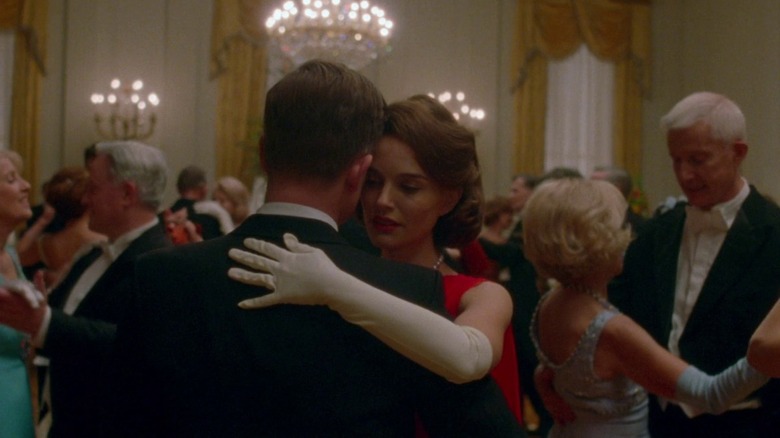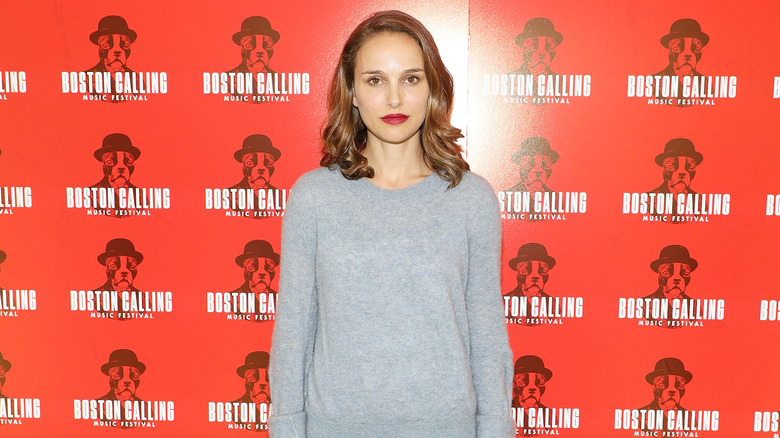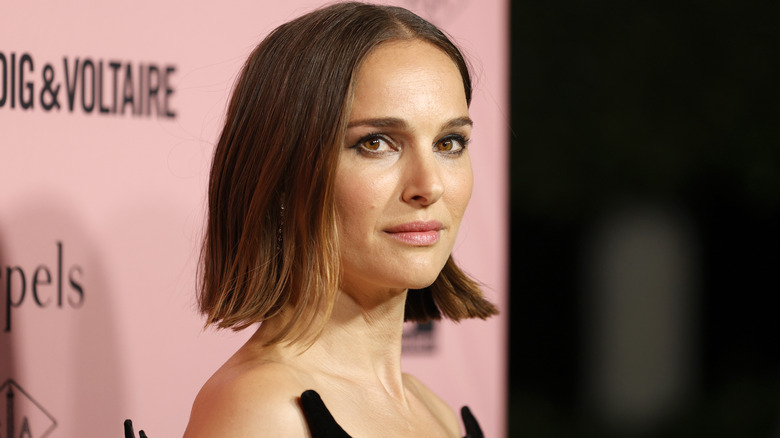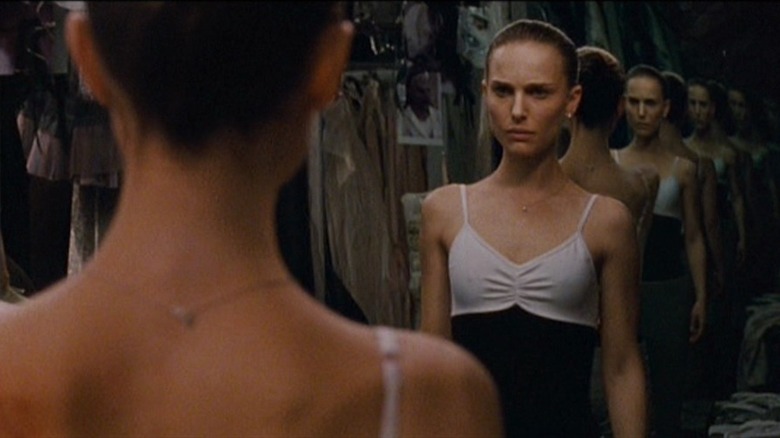The Untold Truth Of Natalie Portman
Natalie Portman's long filmography first began back in 1994 when she was just 12-years-old and appeared as Mathilda in Luc Besson's "Léon: The Professional." From there, she went on to star in films such as "Beautiful Girls" and "Where the Heart Is," before landing the life-changing role of Padmé Amidala in the "Star Wars" prequel trilogy. In 1999, "Star Wars: Episode I — The Phantom Menace" introduced 16-year-old Portman as Queen Amidala and raised her profile to the international stage (and then some).
Following "Star Wars," Portman was seen in more indie fare, starring in notable films such as "Garden State," "Closer," and "V For Vendetta." More recently, she has continued to explore different genres, such as sci-fi in "Annihilation," musical drama in "Vox Lox," and biopic in "Jackie." Her work has often been critically acclaimed and to date, Portman has gotten three Oscar nominations and one Best Actress win for "Black Swan."
Portman clearly refuses to be pigeonholed into one genre or type of role, so perhaps it wasn't totally surprising to see her take on the character of Jane Foster in "Thor" in 2011. She reprises the role in "Thor: Love and Thunder," which focuses heavily on Jane Foster.
Fans of the actress may already be familiar with all of this information, having likely seen the bulk of these films. But, there is much more to the actor and her projects than what lies on the surface. Here, we'll break down the untold truth of Natalie Portman to give even her most ardent fans more insight into the Oscar-winning actor.
Portman credits her acting career to her parents
While speaking with Interview Magazine in 2016, Portman opened up about her relationship with her parents, Shelley and Avner Hershlag, whom she said she has "a friendship" with. She noted that while she "missed out" on having built-in friendships with siblings because she is an only child, it is also part of the reason she was able to have a career in acting to begin with. Portman explained, "I know that I couldn't be doing what I am doing now if I had brothers and sisters. Because my mom devotes so much of her time toward me."
The actor discussed her parents again in 2020 during an interview on the podcast "Mom Brain" with hosts Hilaria Baldwin and Daphne Oz. Portman explained how her parents tried to keep her safe, while letting her explore the new world of acting: "My parents were super protective, always by my side. I really had an incredible experience where I got to play and travel and meet interesting people and be exposed to a lot of ideas and cultures that I think I never would have had the opportunity to" (via Yahoo).
Backlash from the Star Wars prequels impacted Portman's career
From 1999 to 2005, Portman starred as Padmé Amidala in the "Star Wars" prequel trilogy: 1999's "The Phantom Menace," 2002's "Attack of the Clones" and 2005's "Revenge of the Sith." With quite the reputation to live up to following some of the most popular and critically acclaimed films of all time, the prequel series fell flat with critics (and many audience members). "The Phantom Menace," for one, holds a middling Tomatometer score on Rotten Tomatoes.
Speaking with Empire Magazine, Portman recalled what it was like to experience the lackluster reception when the films came out. She said, "It was hard. It was a bummer because it felt like people were so excited about new ones and then to have people feel disappointed. Also to be at an age that I didn't really understand that's kind of the nature of the beast. When something has that much anticipation it can almost only disappoint."
Unfortunately, the poor reception of the "Star Wars" prequels also led to some career hurdles for Portman. She told New York Magazine, "Everyone thought I was a horrible actress. I was in the biggest-grossing movie of the decade, and no director wanted to work with me." She elaborated that it took Mike Nichols — director of "Closer" — vouching for her in order for her to get jobs following "Star Wars."
Despite the initial backlash, many fans have grown to love the films, which Portman appreciates. On the evolved perspective, Portman told Empire, "With the perspective of time, it's been re-evaluated by a lot of people who actually really love them now. There's a very avid group of people who think they're the best ones now!"
Portman regrets her involvement in the Manic Pixie Dream Girl trope
If you're not familiar, the "Manic Pixie Dream Girl" (or MPDG) trope refers to a stock female character, who "exists solely in the fevered imaginations of sensitive writer-directors to teach broodingly soulful young men to embrace life and its infinite mysteries and adventures," according to critic Nathan Rabin, who coined the term in 2007 when reviewing "Elizabethtown" for The AV Club. One of the most well-known manic pixie dream girl characters is Portman's Sam in "Garden State," whom Rabin even notes is a "prime example" of this type of fantasy woman seen on-screen.
Portman has not shied away from addressing her role in perpetuating the widespread trope, telling Vanity Fair in 2018 that she finds it "very upsetting to be a part of that." She also addressed her MPDG role more extensively in 2015 at a Toronto Film Festival panel: "I appreciate that people are writing characters that are interesting and unusual, rather than some bland female character as the girlfriend in a movie, but when the point of the character in this movie is to, like, help the guy have his arc, that's sort of the problem, and that's why it's good that they're talking about it, because it certainly is a troubling trope" (via Vulture).
She has since made it clear that she will never play a MPDG again, as the headline of a 2019 profile with Elle declares. Portman elaborated to Elle: "It certainly is stifling to be the one who's enacting someone else's idea of how a young woman should behave." One look at her filmography, especially in the years after "Garden State," and it's clear that she has committed to breaking out of these restrictive female roles and tropes.
Portman told Aaron Sorkin Harvard stories for The Social Network
From 1999 to 2003, Portman attended Harvard University, where she earned a degree in psychology (via The Washington Post). When she heard that screenwriter Aaron Sorkin was writing "The Social Network," a biopic about Facebook founder Mark Zuckerberg, who famously dropped out of Harvard, Portman reached out to Sorkin to share some stories of her time at the university.
At a sneak peek screening of the film, Sorkin told the audience, "Natalie Portman got in touch with me when she heard that I was doing this to say, 'Listen...come over for dinner and I'll tell you some stories.' I would've come over for dinner under any circumstances. But that was really helpful" (via Entertainment Weekly).
Further, when Portman was a guest on "Hot Ones," the Youtube talk show series from First We Feast, host Sean Evans asked Portman for details about what she shared with Sorkin. Portman revealed, "I think [I] just mainly talked about what the Finals Club scene was like ... [they were] kind of like fancy fraternities, boys clubs ... You could only get in if the guys let you in."
Portman says being sexualized at a young age impacted both her mental health and her career path
Portman has been in the public eye for decades now, ever since she mad her debut in "Léon: The Professional" when she was just 12-years-old. In 2020, Portman told Dax Shepard on his podcast, "Armchair Expert" that the part placed her in the role of a "Lolita figure," resulting in Portman being sexualized at a young age (via People). Reflecting on what it was like to be put in that position, Portman said, "I think [it] took away from my own sexuality because it made me afraid ... Whereas at that age, you do have your own sexuality and you do have your own desire, and you do want to explore things and you do want to be open. But you don't feel safe, necessarily, when there's older men that are interested, and you're like, 'No, no, no, no.'"
Not only was Portman affected heavily mentally by this, but it also affected her career path. Portman revealed to Shepard that all throughout her teens, she intentionally chose roles that wouldn't include sex scenes or other scenarios in which she could be objectified further. She continued, "I would start choosing parts that were less sexy because it made me worried about the way I was perceived and how safe I felt" and noted that this approach worked for her, as people saw her as "super serious and conservative," which led to her ultimately being safe.
Portman didn't have friends in the industry until Time's Up
Portman is heavily involved in Time's Up, the anti-harassment group that's focused on keeping women safe in the workplace (via The New York Times). The group was started by 300 prominent women in Hollywood, and those involved include Jennifer Aniston, Reese Witherspoon, Shonda Rhimes, and Meryl Streep. As it turns out, not only has Time's Up offered a rewarding experience of fighting for a good cause, but it has also paved the way for Portman to make female friends in Hollywood for the first time in her life.
While speaking to Vanity Fair in 2018, Portman opened up about the experience of making industry friends so far into her career. She said, "I've been working for 25 years — I've never had friendships in my industry until now. You're usually the [only] girl in the movie. It's made us come together. We're actively gathering. Just the power of us getting to know other women in our own industry and sharing information that can help us be safer, more productive, more successful."
Portman loves Dirty Dancing
It's always interesting to hear about which movies are the ones that film stars count as their favorites. For Portman, a certain dance romance film is at the top of the list. "Dirty Dancing," which came out in 1987, has become one of the most classic films of its time, perhaps thanks to its inclusion of one of the most iconic dance scenes of all time. If you're somehow unfamiliar with the plot, "Dirty Dancing" centers on Frances "Baby" Houseman (Jennifer Grey), a young woman who spends the summer of 1963 at an upscale Catskills resort in upstate New York. While there, she falls in love with her dance instructor, Johnny Castle (Patrick Swayze). Not only has the film maintained relevancy over the years, but it also remains beloved with movie watchers of all generations. And, as it turns out, Portman counts herself as one of the film's biggest fans.
In a video for the AFI (American Film Institute) Movie Club, Portman introduced "Dirty Dancing," noting that it is one of her favorite movies and definitely her most-watched film. Affectionately, she explained the film's appeal, saying, "Lots of love and phenomenal dancing ensues and it's just one of the best, the best movies."
Portman has mixed feelings about the representation of Annihilation
In 2018's "Annihilation," Portman leads the cast as Lena, a biology professor and Army veteran. The film follows a group of explorers, who venture into "The Shimmer," a quarantined zone full of mutated creatures and landscapes that are transformed by an alien presence. Alongside Portman, the main cast includes Jennifer Jason Leigh, Gina Rodriguez, Tessa Thompson and Tuva Novotny, which makes "Annihilation" one of the few sci-fi films with a predominately female cast.
While Portman is proud of the fact that the cast is made up of mostly women, she does have negative feelings about the unintentional whitewashing. The film is based on the novel of the same name by Jeff VanderMeer and, in the book's sequel "Authority," it is revealed that Portman's character is of Asian descent and Leigh's character is half-Native American. Portman learned of this in an interview with Yahoo, in which she said "that does sound problematic," but also clarified that it was the first she was hearing of it.
Portman addressed the controversy again during an interview with Buzzfeed News, confessing that she feels "terrible" about the situation. She continued, "There's much fewer women onscreen than men [in general], and this movie has so many [women] and I feel so proud of it. And particularly women of color are not seen on screen [in films] — and this movie also has wonderful representations of women of color as well! ... I would hate to be part of that problem. We based it on the first book, which does not mention race at all."
Portman looks up to Diane Keaton and Lily Tomlin
It's always fascinating to hear who actors are inspired by — whether it be fellow actors, directors, or even people they know in real life. When it comes to the genre of comedy specifically, Portman looks up to veteran actors Diane Keaton and Lily Tomlin. During her "Hot Ones" interview, host Sean Evans asked Portman why she considers Keaton and Tomlin to be two of her "comedic heroes."
Portman explained, "They have such unique voices and personalities. And I think there's so many stereotypes of how we want to see women and how we want women to behave in society that, you know, we're just not seeing enough different personalities and different types of people. Because there's a whole spectrum, you know, not just girls wanting to get married and talk about boys with each other."
This is not the first time that Portman has spoken about her idols publicly before. In 2017, Portman told Jimmy Kimmel about a time she met Tomlin as a kid outside of the Kennedy Center in Washington DC after Tomlin's show. Portman giddily recalled, "I remember she wrote me, 'Love and goosebumps, Lily Tomlin.'"
Portman reached out to former directors for advice when helming her directorial debut
In 2015, Portman made her directorial debut with "A Tale of Love and Darkness," which she also wrote, based on the memoir of the same name by Israeli author Amos Oz. The film, which is set in the first years of an independent Israel (following the end of the British Mandate of Palestine), follows Amos Oz (Amir Tessler) as he becomes a writer, inspired by the stories of his mother, Fania (Portman). "A Tale of Love and Darkness" was generally well received and currently holds a Tomatometer score in the low 70s on Rotten Tomatoes.
Directing for the first time would definitely be a daunting experience for anyone, even if you're grown up working as an actor, as Portman has. To help with her first time directing, Portman reached out to directors she has worked with in the past for advice. These directors included Mike Nichols, Darren Aronofsky, and Terrence Malick, who Portman worked with on 2004's "Closer," 2010's "Black Swan" and 2017's "Song to Song" respectively.
Speaking to Business Insider, Portman opened up how these filmmakers helped her in the directorial process, noting that she had already learned a lot from them while working on their films. She added, "I really leaned on them most, I think, during the editing process, where I got to show them the film and get their feedback. It was really helpful mainly because they are such different filmmakers and they were all very encouraging of me making my own thing. They would say, 'Obviously I would do this this way, but you need to do it your way.'"
Being a parent helped Portman channel Jackie Kennedy
In 2016, Portman portrayed Jackie Kennedy in Pablo Larraín's biopic about the former first lady, "Jackie." The film follows Jackie in the days following her husband's assassination, as told through an interview with Life Magazine at her home in Hyannis Port, Massachusetts. The performance earned Portman her third Oscar nomination (and second in a leading category), following "Black Swan" and "Closer."
During an interview with Time Magazine in 2016, Portman revealed one detail from her personal life that helped her tap into the role — being a parent. Portman explained, "It makes you understand the ability to be calm and collected under that kind of emotional and psychological pressure. When you have kids, you can't afford to be a mess. There's moments when you are, but you need to pull it together. You see how that impacted her ability to gather herself under such awful circumstances."
Portman finds acting and psychology similar
Portman went to Harvard University, where she earned a degree in psychology when she graduated in 2003 (via Insider). During her "Hot Ones" appearance, host Sean Evans wondered if her psych degree gives her "edge" in Hollywood. Portman responded, "It's the same thing, really, being an actor and the study of psychology. Because you're basically looking at people and thinking, why do they do the things they do."
In 2004, shortly after graduation, Portman admitted in an interview with The Independent that her psychology education had already come in handy with her acting career. She said, "I use my psychology background all the time ... there's always studies that I've read or something I've read in college that I'll remember when I'm reading a script about a certain disorder, like 'this person might be a little bipolar or associative', those kinds of things." As an example, in 2006's "Goya's Ghosts," Portman played a character with a specific disorder. To help with the role, Portman contacted one of her old professors who talked her through the specifics of the disorder. Portman added, "It's a great resource to have, these great professors."
Portman regrets signing the Polanski petition
Roman Polanski, while an acclaimed director known for films such as "Chinatown" and "The Pianist," is also a known sex offender. In 1977, Polaski was arrested on six charges, including rape by the use of drugs and unlawful sex with a minor after raping a 13-year-old girl; after initially pleading not guilty, he admitted to having sex with a minor in a plea deal (via Salon). After fleeing the US during his trial, Polanski was then arrested in Switzerland in 2009, 31 years after his initial arrest (via The Guardian). In response to his arrest, over 100 people who work in the film industry signed a petition to release the filmmaker — the signers included prominent figures such as Martin Scorsese, David Lynch, and Wong Kar Wai (via IndieWire). Portman was also one of these signers — a move that she now deeply regrets.
Speaking with Buzzfeed News in 2018, Portman admitted, "I very much regret it. I take responsibility for not thinking about it enough." She elaborated that she signed it because someone that she respected asked her to, and she agreed without further thinking it through. She now knows it was a mistake. She continued, "The thing I feel like I gained from it is empathy towards people who have made mistakes. We lived in a different world, and that doesn't excuse anything. But you can have your eyes opened and completely change the way you want to live. My eyes were not open."
If you or anyone you know has been a victim of sexual assault, help is available. Visit the Rape, Abuse & Incest National Network website or contact RAINN's National Helpline at 1-800-656-HOPE (4673).
Portman is proud of the risks she took with Black Swan
Many would argue that Portman's best work is in 2010's "Black Swan," for which she won her first Oscar for Best Actress. If you've seen the film, then you know that it's a psychological horror-thriller with a ballerina's dangerous ambition at the center of the narrative. Portman considers it a risky role, but one that paid off. While speaking at a Harvard graduation ceremony in 2015, Portman admitted to the graduates that she was underprepared when she took on the role, noting that she may have turned it down had she known the extent of preparation she would need (via CBS News). She continued, "The point is, if I had known my own limitations, I never would have taken the risk. And the risk led to one of my greatest personal and professional achievements."
Previously, Portman called working on the film a "beautiful gift" during her Golden Globe acceptance speech. Explaining why it was so fulfilling, Portman recalled how, with each scene, director Darren Aronofsky would say, "Now do this [take] for yourself." Speaking about this moment from her speech to Vanity Fair, Portman elaborated on what that environment meant for her and for her acting career. She explained, "It was a turning point for me personally. That film is about a girl trying to please others and ends up figuring out how to make pleasure for herself. And it was very much a parallel for me — finding the joy in what I'm doing became a major, major change. I felt like, 'Oh, maybe everyone else got this earlier. I just figured it out and I'm 30.'"
